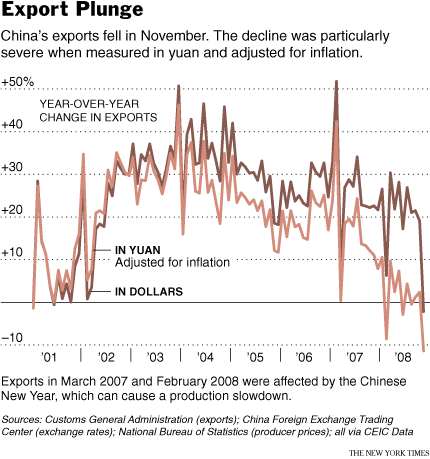…said Victor K. Fung, the chairman of the Li & Fung Group, the giant supply chain management company that connects factories in China with retailers in the United States and Europe. “We’ve got orders we can’t ship right now.”
Source: “As Trade Slows, China Rethinks Its Growth Strategy,” NYT Jan 1, 2009.
The graph from the article shows the nature of the dropoff, even taking into account the volatility in the month-to-month figures:

This further supports the view that trade financing is a substantial constraint to trade. [1]
I’m curious as to the details as to how this happening. The absence of details in fact makes me a bit skeptical. For example, Reuters, who should know better, printed the following as quoted in your previous article:
This is nonsense, because letters of credit from abroad finance Chinese exports, not their imports.
The details would be more informative. For example, what proportion of exporters who used to sell on open account are now demanding letters of credit? Do exporters who used to accept foreign banks’ letters of credit now demand that they be confirmed by local banks? Such extra precautions would of course tie up credit lines and make trade more expensive.
But I can’t imagine Chinese exporters demanding bank letters of credit from companies like Walmart.
Also we are told that a big portion of international trade is between subs of multinationals, and I can’t imagine their being afraid of open accounts.
So I wonder how big a factor this REALLY is.
“Chinese banks have been very nervous about accepting letters of credit from abroad, making it tougher for imports to China to get the needed financing.
This is nonsense, because letters of credit from abroad finance Chinese exports, not their imports.”
Probably not non-sense, actually. Banks often confirm LCs of foreign banks and then lend their clients money against the LC proceeds to produce the goods or for general working capital. In normal times LC proceeds are great collateral. Similarly, even clients who don’t need to borrow will often not take the shipment risk on a foreign buyer’s bank without a confirmation. Confirmation lines are also the easiest exposures for risk managers to cut when they are trying to reduce country limits. So the banks unwillingness to take foreign bank risk is a very real impediment to trade.
this is also contrary to the recent ISM report for CHINA. The main reason for ISM(PMI) to go up was the increase in export orders. Yes there is a marked decline in export and trade finance is also collapsing but signs of revival in exports are appearing. The thing to understand is whether this revival is a result of substitution by chinese goods or a general improvement in demand for chinese goods
In the spirit of on-line catalog’s recommendations that say that “readers who enjoyed this also enjoyed …”
http://blogs.cfr.org/setser/2009/01/02/as-trade-slows-china-doesnt-rethink-its-growth-strategy/
One does wonder how much of this is due to retailer troubles here. Walmart may not be in trouble, but most others are.
Another reason may be that when the foreign ask the chinese banks to confirm the L/C, the confirming bank may not want to take on the credit risk of the opening bank. May be the chinese banks extended pre export financing ie: working capital to the chinese supplier based on getting paid when documents were presented against the L/C.
“But I can’t imagine Chinese exporters demanding bank letters of credit from companies like Walmart.
Also we are told that a big portion of international trade is between subs of multinationals, and I can’t imagine their being afraid of open accounts.”
-Farrar
Farrar, Walmart and the other multinationals depend on in country distributors for a lot of their stock and not the original equipment manufacturers overseas. To get your merchandise into WalMart, a Chinese company might have to get in bed with an American company whose only benefit or function was the fact that they sold to WalMart. That company (unlike WalMart) might, and indeed, they often do, operate on a shoestring and frequently run into difficulties.